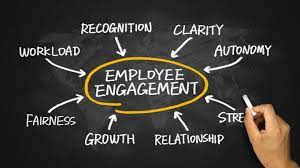Imagine a workplace where every employee is passionate, fully invested in their tasks, and takes pride in their contribution to the organization’s goals. This is the power of employee engagement. A remarkable motivation, it not only enhances job satisfaction but also turbocharges productivity. Fascinated? This blog delves into the profound impact of employee engagement on productivity, unveiling how it can drive success in the workplace. Let’s explore this further!
Contents
- 1 Understanding Employee Productivity in the Workplace
- 2 Understanding The Value of Employee Engagement
- 3 Why Is Employee Engagement Important For Productivity?
- 4 What Impact Do Engagement And Productivity Have On Employees?
- 5 How To Foster Employee Engagement For A Productive Workforce
- 6 Conclusion
- 7 FAQs
Understanding Employee Productivity in the Workplace
 In any organization, employee productivity is a crucial measure of effectiveness and efficiency. But what exactly does it entail? Simply put, employee productivity is the amount of output per unit of input from a worker.
In any organization, employee productivity is a crucial measure of effectiveness and efficiency. But what exactly does it entail? Simply put, employee productivity is the amount of output per unit of input from a worker.
Productivity isn’t merely about how fast an employee can complete a task. It also encapsulates the quality of work produced. Highly productive employees not only perform tasks quickly but also maintain a high standard of work. They are resourceful, and innovative, and constantly look for ways to improve processes and outcomes.
In the workplace, boosting employee productivity is a primary goal for managers and leaders. However, achieving this requires a multifaceted approach, encompassing aspects such as a conducive work environment, effective management, and importantly, strong employee engagement.
Understanding The Value of Employee Engagement
Employee engagement, a crucial factor within any successful business, has a direct impact on productivity. But what exactly is employee engagement, and why does it matter so much?
Employee engagement is the emotional commitment that employees have toward their organization and its goals. It’s not merely about employee satisfaction or happiness, but rather a profound connection that motivates employees to put in that extra effort, thereby boosting their performance and productivity.
Engaged employees are more than just satisfied. They are motivated, enthusiastic, and emotionally connected to their roles, leading to increased productivity and overall business success.
Why Is Employee Engagement Important For Productivity?
 Understanding why employee engagement is crucial for productivity is fundamental in today’s competitive business landscape. Let’s explore why.
Understanding why employee engagement is crucial for productivity is fundamental in today’s competitive business landscape. Let’s explore why.
- Increased motivation: Engaged employees are more motivated to perform their jobs to the best of their abilities. They take pride in their work and feel a sense of ownership over their responsibilities, which leads them to work harder and produce better results.
- Improved job satisfaction: Engaged employees are more likely to enjoy their work and feel a sense of fulfillment from their accomplishments. This leads to higher job satisfaction, which in turn leads to increased productivity.
- Higher levels of commitment: Engaged employees feel a strong connection to their organization and are more committed to its success. They are more likely to go above and beyond their job requirements to contribute to the company’s goals.
- Better collaboration and teamwork: Engaged employees are more likely to work well with others and collaborate effectively on projects. This leads to better teamwork and more efficient use of resources.
- Increased innovation: Engaged employees are more likely to come up with new ideas and innovative solutions to problems. They are more invested in the success of the organization and are therefore more likely to think creatively and take risks.
Overall, employee engagement can have a positive impact on productivity by increasing motivation, job satisfaction, commitment, collaboration, and innovation. As a result, organizations that focus on improving employee engagement are likely to see a boost in productivity and overall performance.
What Impact Do Engagement And Productivity Have On Employees?
 Employee engagement and productivity can have a significant impact on the well-being of individual employees. Here are some of how engagement and productivity can affect employees:
Employee engagement and productivity can have a significant impact on the well-being of individual employees. Here are some of how engagement and productivity can affect employees:
- Job satisfaction: Engaged and productive employees tend to be more satisfied with their work. This can lead to higher levels of job satisfaction and overall well-being.
- Personal growth and development: Engaged and productive employees are more likely to have opportunities for personal growth and development, such as training, coaching, and mentoring.
- Career advancement: Engaged and productive employees may have better opportunities for career advancement within the organization. Moreover, it leads to higher levels of job security and stability.
- Work-life balance: Engaged and productive employees may have more control over their work schedules and workload, leading to better work-life balance and less stress.
- Financial stability: Engaged and productive employees may have better job security and more opportunities for career advancement, leading to greater financial stability and well-being.
- Health and wellness: Engaged and productive employees may experience lower levels of stress and better physical health, leading to improved overall well-being.
- Sense of purpose: Engaged and productive employees tend to feel more connected to the organization and its mission, leading to a greater sense of purpose and fulfillment in their work.
Overall, engagement and productivity can have a significant impact on the well-being of individual employees, leading to higher levels of job satisfaction, personal growth, career advancement, financial stability, health and wellness, and a sense of purpose.
How To Foster Employee Engagement For A Productive Workforce
 Creating a productive workforce is no small feat. It requires a concerted effort, not least in fostering a high level of employee engagement. But how exactly can organizations do this? Let’s delve into some effective strategies.
Creating a productive workforce is no small feat. It requires a concerted effort, not least in fostering a high level of employee engagement. But how exactly can organizations do this? Let’s delve into some effective strategies.
- Open and Honest Communication: Regular and clear communication between management and staff fosters trust, ensures everyone is aligned with the company’s goals, and makes employees feel valued and involved.
- Recognition and Appreciation: Recognizing and appreciating employees for their contributions can significantly boost their engagement levels. Be it a public acknowledgment, a thank you note, or a tangible reward, acknowledging hard work and dedication motivates employees and encourages them to maintain or improve their performance.
- Professional Development Opportunities: Employees are more likely to be engaged when they see the potential for growth within the organization. Offering opportunities for learning and advancement encourages employees to invest in their future with the company, increasing their engagement and productivity.
- Positive Work Environment: A healthy, positive, and inclusive workplace can make a significant difference in employee engagement. An environment where employees feel safe, respected, and comfortable boosts morale, which in turn can drive productivity.
- Work-Life Balance: Encouraging work-life balance demonstrates that the organization values its employees’ well-being. Flexible work hours, remote work options, and ensuring employees are not overworked can go a long way in promoting engagement.
- Empowerment and Autonomy: Empowering employees to make decisions and have control over their work can lead to higher engagement levels. It not only boosts their confidence but also makes them feel respected and trusted.
- Consistent Feedback: Providing consistent and constructive feedback helps employees understand their strengths and areas of improvement. This continual loop of communication keeps employees engaged and focused on their personal growth and the goals of the company.
Conclusion
Employee engagement and productivity are intrinsically linked, and fostering this engagement is pivotal for businesses to thrive. It’s not just about creating a more vibrant workplace but also driving key business outcomes. Remember, it’s the engaged workforce that forms the backbone of a productive, innovative, and successful organization.
And if you’re looking to take employee engagement to the next level, wellness programs like those offered by MantraCare can be a game-changer. Our comprehensive well-being programs including EAP, Employee Diabetes Reversal, Corporate MSK, Employee Fitness, Corporate Yoga, and Employee meditation, are tailored to boost employee motivation, productivity, and retention. Start investing in your employees’ well-being today and watch your organization reach new heights of success.
FAQs
1. What is the goal of productivity?
The goal of productivity in the workplace is to maximize output using the least amount of inputs without sacrificing the quality of output. This essentially means getting more done with fewer resources, such as time, money, and labor. Achieving high productivity levels can lead to improved operational efficiency, increased profitability, and enhanced customer satisfaction.
2. What factors improve productivity?
Several factors can enhance productivity in the workplace. These include:
- Employee engagement:
- Effective communication:
- Training and development
- Positive work environment
- Technological advancement
3. What factors affect employee productivity?
Several factors can negatively impact employee productivity:
- Poor Management
- Lack of Engagement
- Insufficient Training
- Work Overload
- Negative Work Environment
